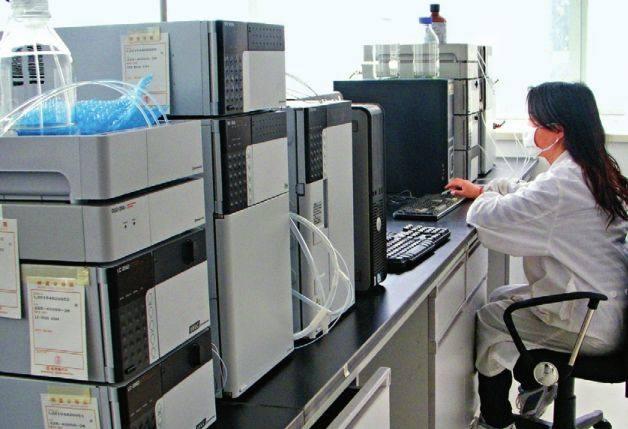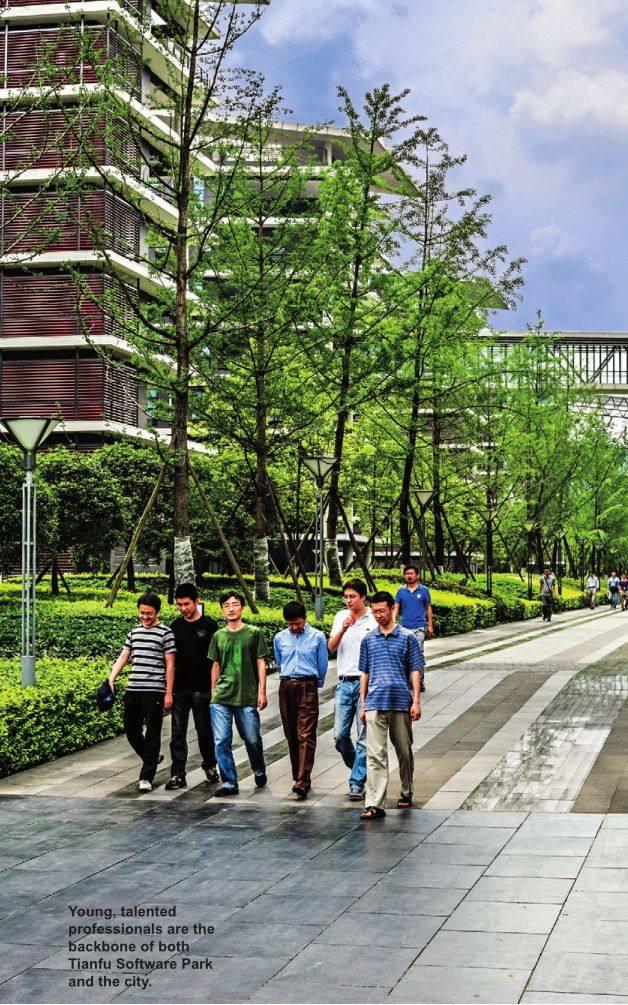Innovative Chengdu
By staff reporter ZHU HONG
TODAY, we are changing the way people experience cellphone cameras,” proclaimed Xu Hao, the 34-year-old CEO and founder of Pinguo Technology at the 2013 Fortune Global Forum, revealing his new “Camera 360” to a crowd of investors.
“Camera 360 is not simply a photo capturing device but a tight integration of images and the mobile Internet,” he further explained. “Our company is devoted to providing the perfect image experience for mobile gadget users.”
Xus passion for the mobile Internet and innovative cellphone camera technology was born in the city of Chengdu. Today, “Camera 360” has scored more than 120 million users in 128 countries. Xu considers Chengdu a city rife with creative inspiration, which is why he chose to start his business there.
Global Vision
“The key to integrating into the world market is breakthroughs in the industrial chain,” remarked Gilbert Pastor, vice president of Montpellier MegaEconomic Zone. “Chengdu has impressively merged into the global hi-tech industrial fast lane.”
Chengdu has become a rising star in the global hi-tech industry, already luring in Fortune Global 500 companies including Intel, IBM, Symantec, FAW, and VW who position the city in the top echelon of their international operations.
Meanwhile, local tech companies are also testifying to the innovative power of the city.
“So far, there are 13,000-plus Chinese small and medium-sized companies in the Chengdu Hitech Industrial Development Zone,” Tang Jiqiang, director of the zones strategic development planning bureau, told China Today. “The ‘incubatoraccelerator-industrial park mode has enabled local companies to cooperate with their foreign peers to form an industrial cluster, which increases their visibility in the global market.”
Pinguo Technology is an outstanding representative of local high-tech enterprises. Tianfu Software Park, where Pinguo is located, is the fastest growing software park in China and the flagship of Chengdus booming IT industry.
“We provide venture consulting services and platforms for exchanges within industry circles,”said Chen Li, manager of Tianfu Software Parks Brand Planning center.
Inspiration Café, a popular meeting place in the park, plays a very important role in providing such a platform. It is a locale for young people to sit together, debate exciting ideas and hold video conferences. Entrepreneurial teams discuss projects indepth and work out details with venture investors. Some may be about cooperative deals with the team sitting at the next table.
Innovate or Die
“These days, enterprises quickly lose out if theyre not constantly coming up with something,”said Zou Xueming, CEO of AllTech Medical Systems. In Mr. Zous opinion, independent innovation coupled with learning from the successes of others are the keys to AllTechs success.
Zou graduated from Massachusetts Institute of Technology in 2005 and now lives in Chengdu.
“With its many colleges and research institutions, such as Sichuan University, Southwest Jiaotong University, and University of Electronic Science and Technology, Chengdu has strong talent resources needed by hi-tech companies,” Zou noted. “Besides, neighboring cities like Deyang and Mianyang are perfect for supporting industries. Sixty percent of our auxiliary businesses are based in cities surrounding Chengdu.”
Zou added that the government lays great store on bio-engineering and pharmaceutical industries and has a progressive vision and plan for their long- term development. AllTech secured nearly RMB 500 million in venture investment through government assistance.
In order to beef up the companys innovation muscle, Zou recruited more than 40 experts in medical imaging to form a world-class research team, which later established long-term cooperative agreements with local universities.
AllTechs first product, Centauril 1.5T, a superconducting MRI (magnetic resonance imaging) system, is the first domestically developed and produced product of its kind, breaking the international technology barrier, and bringing down the price. It is priced 30 percent lower than competitors in the global market. Having passed certification by the U.S. FDA, the EUs CE, and both China and Russias SFDA, the Echostar Centauri 1.5T was successfully introduced to the international market in 2010.
“There is something powerful about Chengdu,”opined Chen Yuanwei, general manager of Chengdu ChemPartner Co., Ltd., praising Chengdus innovative spirit. “Here, opportunity becomes real change.”
ChemPartner works with Fortune Global 500 companies such as Pfizer and Micromeritics in drug development through Contract Research Organization (CRO). They share information through bulk data transfer and exchange recently developed products by airmail. Such international communication wouldnt be possible without a strong research team and huge investment in public technology service platforms for biomedical testing.
“Scientific research innovation is the core competitiveness of Chengdu in its drive to become a modern international city,” said Chen.
Protecting Innovation
Chengdu Mayor Ge Honglin prefers to promote the city as one of the first winners of the national award for intellectual property protection. He considers protecting intellectual property as the best way of respecting talent and investors while laying a solid foundation for long-term development.
Mr. Ge is quick to relate how Intel combed through local courts intellectual property case histories before deciding on the location for a new plant. It concluded that Chengdu is effective at protecting intellectual property. Now, 50 percent of Intels production happens in this southwestern Chinese city.
“It took innovation to create a prime intellectual property protection environment in Chengdu, which in turn enabled an intellectual property service platform for enterprises to start innovative research projects,” explained Mi Ziwei, head of the citys intellectual property service center. “Our center provides researchers with access to patent data resources around the world and professional consulting services.”
In fact, Chengdus credibility in terms of protecting intellectual property has attracted global 500 companies such as IBM, Sony Erricson, EMC, Alcatel and Bosch to establish research and development centers there.
To better support small and medium-sized technology-based enterprises, Chengdu is fostering the pledge financing market. It started through government guidance, but when the market matures, the government will gradually step away.
When Jinxing Luyuan, an environmental protection technology firm, independently developed a device to produce and process chlorine dioxide for wood pulp bleaching in paper-making industry, a first for China, it applied for pledge financing with Chengdus Productivity Promotion Center. On the back of five of its patents as the collateral, it got the financial guarantee from the center, which enabled it to receive a dearly needed bank loan to kick start mass production of its new invention.
So far, 99 companies in Chengdu have acquired a combined RMB 4 billion in bank loans through the pledge financing system.
The efforts Chengdu has made to protect intellectual property, foster innovation and develop talent are becoming powerful competitive forces for the city.
“I am looking forward to seeing Chengdu, a city of innovation, become a city of wealth,” smiled Mi Ziwei.

